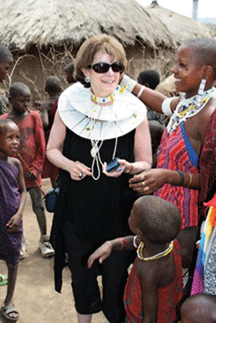
Class of ’63 | For the 14 people who accompanied Marjorie Margolies CW’63 on a two-week trip to Tanzania this past January, the excitement of seeing a zebra in the Serengeti soon faded. What made a lasting impression were the tribal women and children they met in three different villages.
The group was on what Margolies describes as a “vacation with an education”—part safari, part “Introduction to Village Life 101.” Given that she spends a great deal of time in poor African nations as head of Women’s Campaign International (WCI), an NGO she founded 13 years ago to empower women in developing countries, it was familiar territory to her.
Margolies organized the trip to Tanzania with Kiera Reilly C’93, director of Penn Alumni Travel, so that the participants could visit villages where WCI has a presence. They met Masai women and children, visited families in their homes, inspected an HIV/AIDS women’s cooperative, and attended a wedding.
A few months later, in her somewhat cluttered office at WCI headquarters at International House, Margolies is talking excitedly about the Tanzania vacation, her work for women—and the wedding of her son, Marc, who a year ago married one Chelsea Clinton. Pictures of Bill and Hillary Clinton Hon’93 hang among the family photographs and African masks. Enthusiastic and energetic, Margolies is constantly on the move—whether it’s bouncing from one topic to another or driving to meetings at the United Nations or to Washington on behalf of WCI.
The idea for the latter was born in 1995 when Margolies led the US delegation to the UN’s Fourth World Conference on Women in Beijing, which was chaired by Hillary Clinton.
“It became very clear that we had to start getting more women to the table,” says Margolies, who teaches a class called Women Leaders and Emerging Democracies at Penn’s Fels Institute of Government [“Gazetteer,” Sep|Oct 2008]. “In most places where WCI goes, women are marginalized in the most dramatic ways. They are afraid to speak out.”
In Tanzania, Margolies relates, many of the natives had never met Americans before, and in each of the villages, they spoke different languages.
“Through a translator, they asked us lots of lovely family questions,” she says. “For instance, they wanted to know how we educated girls and how American women manage to work and take care of many children.”
Margolies is particularly well placed to answer that one, having raised 11 children while working as a television journalist and then as a US Congresswoman—neither of which allowed her the luxury of spending much time in her suburban Philadelphia home. But then, she wasn’t exactly a conventional mother anyway. In fact, she wasn’t even married when she adopted her first child at 28.
“I was doing a story about unwanted children for WCAU-TV and decided that I wanted to help by adopting one myself,” she says. “But I was turned down by agencies in this country because of my marital status.”
As a result, she became the first single American woman to adopt a foreign-born child, Lee Heh, from Korea, in 1970. Four years later, she adopted another little girl, Holly, from Vietnam. She wrote about the experience in They Came to Stay (1976).
After her marriage to former Congressman Ed Mezvinsky in 1975, Margolies raised his four daughters from his first marriage, adopted three boys from Vietnam, gave birth to two sons, and sponsored countless refugees. Now divorced, she’s grandmother to 16.
“I grew up in a family that always tried to reach out to help others,” she says, speculating about her charitable instincts. “When I was 16, we sponsored a young woman from a developing country, and later, [when I was] a Penn undergrad, my parents sponsored another foreign-born woman. I considered both of them sisters.”
They also enlarged her perspective. Since her junior year abroad in Spain, Margolies has been at home in the world.
Two years on Capitol Hill educated her in the ways of politics and politicians. She was the first woman, the first Jew, and the first Democrat to be elected to Congress from Pennsylvania’s somewhat conservative 13th District in 1992. But after voting for Clinton’s controversial budget bill, which balanced the federal budget but infuriated her constituents by raising taxes, she lost her seat in the House.
“I was amazed by the level of their hostility,” she recalls, still sounding shocked.
Margolies doesn’t rule out a future political office, but for the time being she is concentrating her energies on helping women in other countries get elected. In Malawi, for instance, WCI helped to double the number of women in government.
WCI has established programs in more than 20 countries, including Afghanistan, Azerbaijan, Bosnia-Herzegovina, Colombia, Ethiopia, and Venezuela.
“A large part of what we do is teach women to speak out,” says Margolies. “There’s a great fear of public speaking among these women, and in many communities, they are called wives, or sisters, or daughters, but never by their names, as if they were chattel.”
As part of the Clinton Global Initiative, WCI also implements entrepreneurship and sustainable-livelihoods programs for organizations and individuals. One of its great success stories took place in Liberia, which Margolies will revisit this summer.
“They have a horrendous infrastructure and subsequently a lot of the crops go bad,” she explains. “So we went in one area and convinced the women to buy a casaba grinder. They rented it out weekends and with the money they earned, opened a small furniture store. Then they opened a small restaurant and, ultimately, a bed and breakfast.”
Closer to home, WCI started a program called Global Awareness and Leadership Series (GALS), which provides advocacy skills and training to high-school girls from Philadelphia. The teenage girls are learning about financial literacy and social media, and form teams to identify important issues in their community, ranging from dating to discrimination and bullying.
Margolies says that WCI employs a staff of 10 at home and about 20 across the globe, depending on what programs are up and running at any particular time. She oversees all of them and monitors them closely.
For Margolies, the trip to Tanzania was emblematic: “It’s so much fun to exchange ideas and stories with the women we meet. They always have dozens and dozens of questions. Inevitably, we learn as much or more from the women we are visiting as they learn from us. And in the end, our conclusion is that we may speak different languages, but we all speak the same mother tongue.”
—Jane Biberman CW’65




